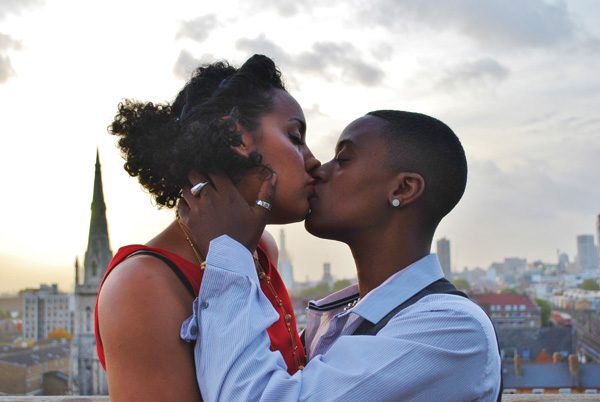British writer/director Campbell X Depicts Urban Queer London’s Stud Life on the Silver Screen
Stud masculinity hit the silver screen with a vengeance in Stud Life, a new feature-length project from the award-winning British filmmaker Campbell X.
The film, which played to sold-out audiences in London, Los Angeles, San Francisco, Oakland, and Trinidad, tells the story of a young black stud who’s faced with the “mates before muff” question when she falls in love with Elle, the film’s hot femme lead, played by Robyn Kerr.
T’Nia Miller stars as JJ, a butch lesbian who is as vulnerable as she is fly; Kyle Treslove portrays JJ’s best friend, Seb, a gay white man who struggles with his femininity before finding his own true love. And while the romantic comedy strikes a lighthearted tone as Seb and Elle wrestle for JJ’s attentions, what’s really exciting about Campbell’s film is her decision to feature a black, masculine-of-center protagonist, which attracted a whole new audience demographic. Stud, aggressive, tomboi, butch, and masculine-of-center queers of color flocked to the LGBT film festival screenings of Stud Life, eager to see themselves on the big screen.
“Studs have responded with joy to the film—it is a result of not seeing too many images of themselves looking hot on the big screen. Some have come up to me and said, ‘That was my life up there—you put my life up there.’ They would tweet me back lines from the film,” says Campbell.
A dapper black stud herself, Campbell empathizes with the audience’s desire to see female masculinity represented on screen. “It makes sense. Why would they come, if they’re not seeing themselves? To see the same thing you can see on telly? There are no masculine-of-center people of color in mainstream queer cinema, or even in indie cinema,” she says.
In the U.S., a few African American lesbian filmmakers actually have tackled the challenge of representing stud lesbians on screen. Director Cheryl Dunye launched Strangers Inside back in 2001; the project was a made-for-cable drama about a mother-daughter stud reunion in prison. Dunye’s recent independent film Mommie’s Coming handled the subject of black butch identity by taking a more playful approach.
She cast her dandy self as the Berlin cab driver who transports her protagonists to and fro. Director Dee Rees’s recent feature Pariah also moved African American studs right into the mainstream. “It is mind-blowing, really. It is the first time somebody has made a film with a black lesbian protagonist who has broken through [to mainstream] consciousness,” Campbell says.
With so few studs on the big screen, writer/director Campbell found her inspiration for the film in her community and on the Internet. “The film is inspired by London and its very vibrant multicultural life and where it comes into creative collision with diverse LGBT people. It’s also inspired by all the bois on YouTube, who are inadvertently creating an archive of female masculinity for generations to come,” Campbell says. “Also, there are web series between women that have stud characters on them. They were influential to my film.”
Seasoned by nearly 20 years of making film, Campbell has stakes in breaking the mold of LGBT films, not only by putting masculine women of color in the foreground, but also by putting kink into the limelight of the rom com genre. “My intention when making any film is to tell a good story with lush visuals. I also challenge us as minorities, whether LGBT or [people of color]. I create nuanced, complex characters who have to be true to themselves—in spite of the temptation, led by my own personal politics, to make them perfectly saintlike and politically correct.”
Elle’s admission that she is a dominatrix is met with outrage when JJ first finds out what her lover does for work. Campbell explains, “JJ is conventional. She is not a perfect stud. She has her flaws. Elle accepts her, but [JJ] does not accept Elle. Often this happens when a stud wants to control a femme, through anger or whatever. So I wanted to raise these concerns.”
Campbell’s focus on desire and femininity in Stud Life is also meant to expand the range of LGBT films. “I wanted to show through Elle, who is a powerful femme, that submission is an active process, not a passive one,” she says.
By rejecting a myopic mainstream view of lesbian characters, Campbell knew she would face funding issues, so she took matters into her own hands, creating the full-length feature on a near-zero budget. “Masculine-of-center females do not represent the idealized ‘saleable’ woman—who can be packaged to mainstream audiences of any sexual orientation. She is being erased from our dominant media—LGBT and straight. I am interested in putting anyone who is forced to the margins right back into the center of the frame.”
